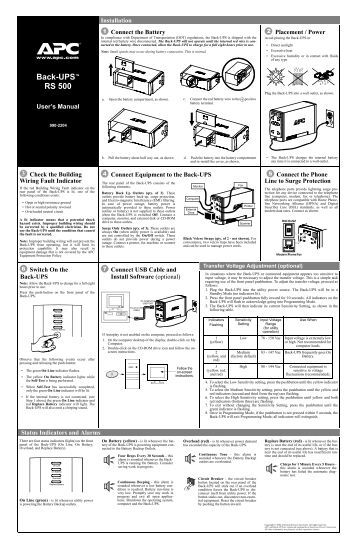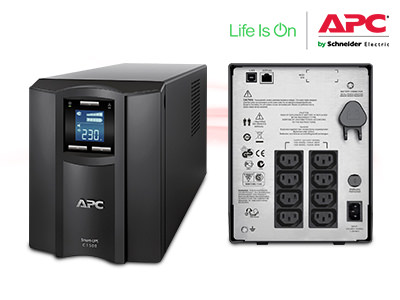APC BACK-UPS RS 1500VA LCD 120V. Uninterruptible Power Supply (UPS). CD with software, USB cable, User Manual. View Product Overview. Back-UPS XS 1000 Installation and Operation 5 Warnings and System Faults Audible Warnings Warning Icons System Faults The Back-UPS will display these fault messages. For faults F01 and F02, contact APC Technical Support. Four Beeps Every 30 Seconds Back-UPS is running on battery. You should consider saving any work in progress.
- Apc Rs 1500 User Manual
- Apc Back Ups Rs 1000 User Manual Download
- Apc Back Ups Rs 1000 User Manual 2017
- Apc Back-ups Rs 1000 User Manual
- Apc Back Ups Rs 1000 Manual Pdf
- Apc Smart Ups 1000 Manual
- Apc Back Ups Rs 1000 Service Manual
Page 2: Contact information, Limited warranty, Transfer voltage and sensitivity adjustment
SPECIFICATIONS
Item
Specification
On-line Input Voltage Range
(default settings)
83 - 147 Vac (RS model)
83 - 139 Vac (XS model)
Automatic Voltage Regulation (AVR)
+12% (XS model) +12% (RS model)
On-line Frequency Range
47 - 63 Hz (autosensing)
On-battery Waveshape
Stepped Sine Wave
Maximum Load
1000 VA - 600 W 1500 VA - 865 W
Typical Recharge Time
8 Hours
Operating Temperature
32
o
to 104
o
F
0
o
to 40
o
C
Storage Temperature
23
o
to 113
o
F
-5
o
to 45
o
C
Operating / Storage Relative Humidity
0 to 95% non-condensing
Size (H x W x D)
14.6 x 3.4 x 13.1 inch
37.1 x 8.6 x 33.3 cm
Weight
1000 VA 22 lbs (10 kg)
1500 VA 25 lbs (11 kg)
Shipping Weight
1000 VA 23 lbs (11 kg)
1500 VA 26 lbs (12 kg)
EMI Classification
FCC / DOC Class B Certified
On Battery Run-Time
See http://www.apc.com/product
TROUBLESHOOTING
Problem
Possible Cause
Corrective Action
Back-UPS will not switch on.
Back-UPS not connected to AC power source.
Ensure the Back-UPS is securely connected to an AC outlet.
Back-UPS circuit breaker “tripped”.
Disconnect non-essential equipment from the Back-UPS. Reset
(push in) the rear panel circuit breaker. Switch on the Back-UPS
and plug in devices one at a time. If the circuit breaker trips
again, disconnect the device that caused the breaker to trip.
Utility input voltage quality is out of range.
Consider adjusting the transfer voltage and sensitivity. See
Transfer Voltage and Sensitivity Adjustment.
Back-UPS does not power
essential equipment during an
outage.

Equipment plugged into a Surge Only outlet.
Unplug device from 'Surge Only' outlet and move to a 'Battery
Backup' outlet.
Back-UPS operates on battery
although utility power exists.
Back-UPS circuit breaker “tripped”.
Disconnect non-essential equipment from the Back-UPS. Reset
(push in) the rear panel circuit breaker. Switch the Back-UPS on
and plug equipment in one-at-a-time. If the circuit breaker trips
again, disconnect the device that caused the breaker to trip.
Utility input voltage quality is out of range.
Consider adjusting the transfer voltage and sensitivity. See
Transfer Voltage and Sensitivity Adjustment.
Back-UPS does not provide
expected backup time.
Back-UPS is heavily loaded.
Unplug non-essential equipment (printers, scanners, etc) from
the Battery Backup outlets and plug into 'Surge Only' outlets.
Back-UPS battery cartridge is discharged due to
recent power outage and has not had time to
recharge.
Charge the battery cartridge for 8 hours. Back-UPS runtime is
reduced until the battery cartridge is fully charged.
Battery has reached the end of its life.
Replace battery cartridge (see Order Replacement Battery
Cartridge).
Red Replace Battery indicator is
flashing. Green On Line indicator
is on.
Internal battery cartridge is not connected.
Connect battery cartridge (see Connect Battery Cartridge).
Red Replace Battery indicator is
on.
Battery has reached the end of its life.
Replace the battery cartridge (see OrderReplacement Battery
Cartridge).
Red Overload indicator is on or
flashing.
Connected equipment is drawing more power than
the Back-UPS can provide.
Move one or more equipment power plugs from Battery Backup
outlets to Surge Only outlets.
Green On Line indicator is on and
all other front panel indicators are
flashing.
Internal UPS fault.
Contact APC Technical Support (see Contact Information).
Battery
Cartridge
REPLACE BATTERY CARTRIDGE
ORDER REPLACEMENT BATTERY CARTRIDGE
The battery cartridge typically lasts 3-6 years, shorter if subjected to frequent outages or elevated temperatures. Order part number RBC33.
Please recycle spent battery cartridges.
990-2163A Copyright © 2007 American Power Conversion All rights reserved.
APC and Back-UPS are registered trademarks of American Power Conversion.
All other trademarks are the property of their respective owners.
SERVICE
If the Back-UPS arrived damaged, notify the carrier.
If the Back-UPS requires service, do not return it to the dealer. The following
steps should be taken:
1.
Consult the Troubleshooting section to eliminate common problems.
2.
If the problem persists, go to http://www.apc.com/support/.
3.
If the problem still persists, contact APC Technical Support.
• Have the Back-UPS model number, serial number and date of purchase
available. Be prepared to troubleshoot the problem with an APC Technical
Support representative. If this is not successful, APC will issue a Return
Merchandise Authorization (RMA) number and a shipping address.
CONTACT INFORMATION
Technical Support
http://www.apc.com/support
Internet
http://www.apc.com
USA / Canada
1.800.800.4272
Mexico
292.0253 / 292.0255
Brazil
0800.12.72.1
Worldwide
+1.401.789.5735
LIMITED WARRANTY
The standard warranty is two (2) years from the date of purchase. APC’s standard
procedure is to replace the original unit with a factory reconditioned unit. Customers
who must have the original unit back due to the assignment of asset tags and set
depreciation schedules must declare such a need at first contact with an APC Technical
Support representative. APC will ship the replacement unit once the defective unit has
been received by the repair department, or cross-ship upon the receipt of a valid credit
card number. The customer pays for shipping the unit to APC. APC pays ground
freight transportation costs to ship the replacement unit to the customer.
In situations where the Back-UPS or connected equipment appears too sensitive to
input voltage, it may be necessary to adjust the transfer voltage. This is a simple task
requiring use of the front panel pushbutton. To adjust the transfer voltage, proceed as
follows:
1. Plug the Back-UPS into the utility power source. The Back-UPS will be in a
Standby Mode (no indicators lit).
2. Press the front panel pushbutton fully inward for 10 seconds. All indicators on the
Back-UPS will flash to acknowledge going into Programming Mode.
3. The Back-UPS will then indicate its current Sensitivity Setting, as shown in the
following table.
4. To select the Low Sensitivity setting, press the pushbutton until the yellow
indicator is flashing.
5. To select the Medium Sensitivity setting, press the pushbutton until the yellow
and red indicators (second and third from the top) are flashing.
6. To select the High Sensitivity setting, press the pushbutton until yellow and both
Apc Rs 1500 User Manual
red indicators (bottom three) are flashing.
7. To exit without changing the Sensitivity Setting, press the pushbutton until the

green indicator is flashing.
8. Once in Programming Mode, if the pushbutton is not pressed within 5 seconds,
the Back-UPS will exit Programming Mode; all indicators will extinguish.
Indicators
Flashing
Sensitivity
Setting
Input Voltage
Range
(for utility
operation)
RS Models
Input Voltage

Range
Apc Back Ups Rs 1000 User Manual Download
(for utility
operation)
XS Models
Use When
1
Apc Back Ups Rs 1000 User Manual 2017
(yellow)
Low
78 - 150 Vac
78 - 142 Vac
Input voltage is
extremely low or high.
Apc Back-ups Rs 1000 User Manual
Not recommended for
computer loads.
2
(yellow,
and red)
Medium
(factory
default)
83 - 147 Vac
83 - 139 Vac
Back-UPS frequently
goes On Battery.
3
(yellow,
red, and
red)
High
88 - 144 Vac
88 - 136 Vac
Connected equipment is
sensitive to voltage
fluctuations .
TRANSFER VOLTAGE AND SENSITIVITY
ADJUSTMENT
Apc Back Ups Rs 1000 Manual Pdf
Notice: This device complies with part 68 and 15 of the FCC rules.Operation is subject
to the following two conditions: (1) This device may not cause harmful interference.
(2) This device must accept any interference received, including interference that may
cause undesired operation.
Apc Smart Ups 1000 Manual
On the bottom of this equipment is a label that contains, among other information, the
FCC registration number and ringer equivalence number (REN) for this equipment. If
requested, this information must be provided to the telephone company.